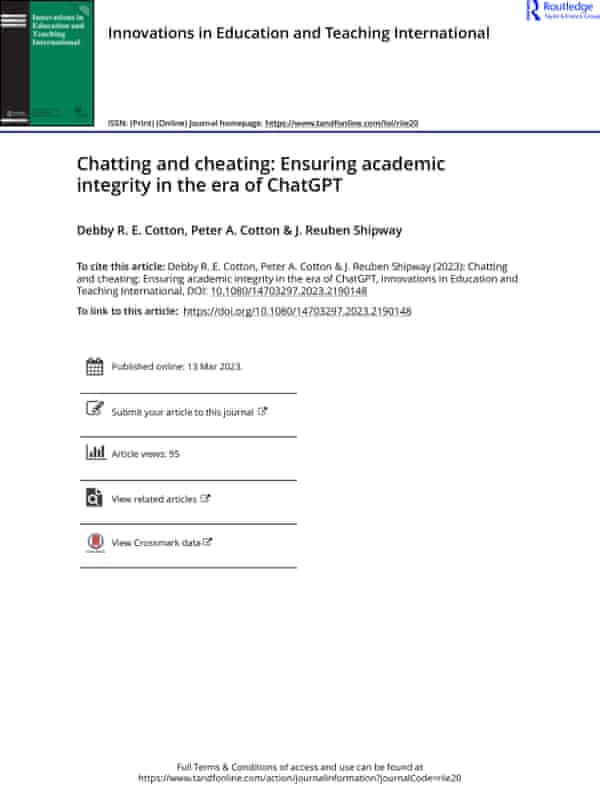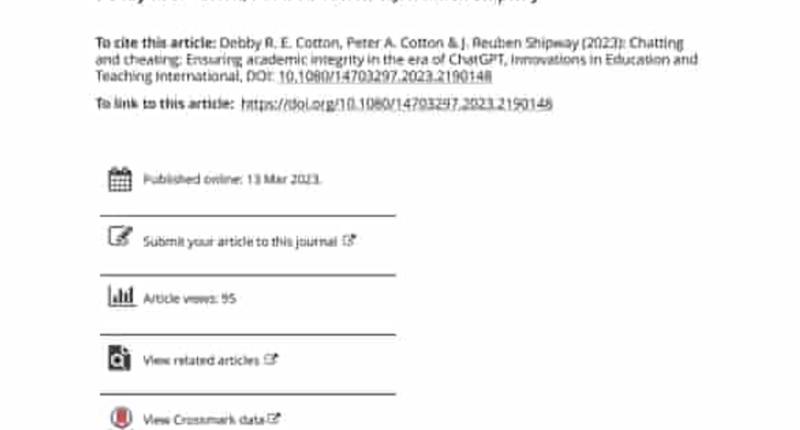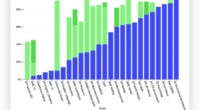Academic institutions are becoming increasingly concerned about the use of AI chatbots like ChatGPT for academic dishonesty. Students who are caught cheating by using such tools risk being expelled. Academics are advised to be alert to language that a student would not normally use and content that lacks critique. Irene Glendinning, head of academic integrity at Coventry University, warns that students who rely on ChatGPT may slip up if they cannot spot the weaknesses in its work. The latest version of the AI model, ChatGPT-4, has raised concerns among academics who worry that cheating could become even more widespread. Bristol University is one of the institutions that have issued new guidance on how to identify the use of the chatbot. However, experts warn that as courses become more specialised, it will become more difficult to outsource work to a machine. Nonetheless, cheating only harms the students themselves, as they are wasting their money and time if they are not using the university to learn.
Academics have released a paper in an education journal called “Chatting and Cheating: Ensuring Academic Integrity in the Era of ChatGPT”. The paper discusses how artificial intelligence tools, such as ChatGPT, present challenges and concerns with regards to academic honesty and plagiarism. Interestingly, the paper was itself written by the AI chatbot ChatGPT, unbeknownst to readers and the peer reviewers who approved it for publication. The paper’s lead author, Prof Debby Cotton, claimed to be human and explained that the experiment aimed to demonstrate the chatbot’s high writing ability. The academics behind the experiment believe that the technology is developing rapidly, making it challenging for universities to keep up. The release of the paper has raised concerns among academics who worry that AI could enable widespread cheating among students. Bristol University has issued new guidance on how to identify the use of ChatGPT and similar programs.

Academics and universities are increasingly concerned about the use of AI chatbots, particularly ChatGPT, for academic dishonesty. Essay mills have reportedly started using the chatbot to produce pre-written essays, and students are also suspected of passing off its work as their own. The quality of ChatGPT’s writing is often on par with, if not better than, that of a student, making it difficult to detect cheating. Nonetheless, there are still some telltale signs, such as the bot’s lack of understanding of academic referencing. Academic institutions are now racing to catch up with the technology, with some planning to expel students caught using ChatGPT to cheat. Bristol University is among the institutions that have issued new guidance on how to identify the use of the chatbot. However, experts warn that as courses become more specialised, it will become more difficult to outsource work to a machine. Despite this, the release of the latest AI model, ChatGPT-4, has raised concerns among academics who worry that cheating could become even more widespread. Prof Kate Whittington of Bristol University has stressed that cheating will not be tolerated, stating that institutions must maintain standards.
Academic institutions are stepping up their efforts to combat academic dishonesty by students who use AI tools like ChatGPT to cheat. Those caught using the chatbot may be withdrawn from the university and required to do training on appropriate use of AI. Repeat offenders risk expulsion. Irene Glendinning, head of academic integrity at Coventry University, advises academics to be alert to signs of cheating, such as language that a student would not normally use and content that lacks critique. She also warns that students who rely on ChatGPT may slip up if they cannot spot the weaknesses in its work. Glendinning emphasises that cheating only harms the students themselves, as they are wasting their money and time if they are not using the university to learn.
Don’t miss interesting posts on Famousbio










